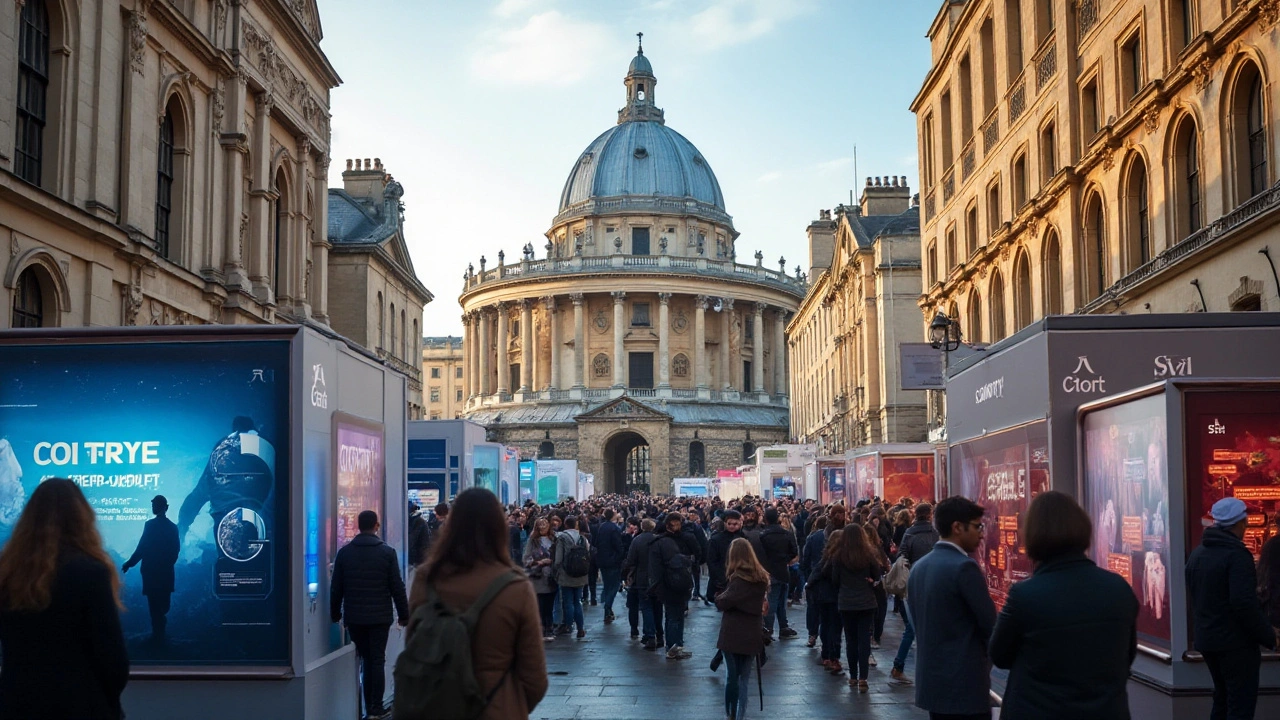Our world is rapidly changing, and AI stands at the forefront of innovation, wielding incredible power to reshape how we solve problems. This transformative force not only enhances our capacity to address daily challenges but also drives major technological progress across industries.
Imagine a tool kit, filled with AI’s cutting-edge strategies and applications, designed to boost productivity and creativity in tackling issues. The emergence of these intelligent solutions is not just a trend, but a pivotal shift in our problem-solving paradigms.
In this article, we'll delve into the intriguing realm of AI tricks, exploring how their implementation revolutionizes processes and opens doors to new possibilities. Whether it's through smart algorithms in healthcare, predictive models in business, or automated systems in every sector, AI's potential is boundless.
- Understanding AI Principles
- AI in Everyday Problem-Solving
- Innovative AI Tools and Techniques
- Future Implications of AI Solutions
Understanding AI Principles
The journey into artificial intelligence begins with grasping its foundational concepts, which have revolutionized not only technology but numerous domains of our everyday life. At its core, AI mimics human intelligence through the creation of smarter machines designed to perform tasks previously requiring human insight. To comprehend this, it's essential to explore the branches of AI, which include machine learning, natural language processing, and neural networks—each playing a vital role in how we understand AI's capabilities today.
Among these, machine learning stands as a pillar in AI, empowering systems to learn and adapt without explicit programming. This occurs through algorithms that analyze patterns in vast data sets to make decisions or predictions, progressively improving over time. In fact, IBM once reported that businesses utilizing machine learning witnessed an efficiency boost of up to 40%, making it a cornerstone in problem-solving strategies.
Equally pivotal is natural language processing (NLP), which enables machines to understand and interpret human language, closing the gap between man and machine. This capability is evident in chatbots and virtual assistants like Alexa or Siri, which are transforming user interaction through more intuitive engagements. By improving the way machines process linguistic nuances and respond contextually, NLP not only enhances communication but can also automate mundane tasks, significantly improving user experience.
A critical component often discussed is neural networks, inspired by the human brain's connectivity. These networks, which consist of layers of interconnected nodes, allow AI systems to process complex data inputs to solve advanced problems, like recognizing images or modelling weather patterns. It’s fascinating to see how these principles come together to create systems that draw insights from vast amounts of data, ultimately making them indispensable in the quest for efficient problem-solving solutions.
"The science of artificial intelligence is not just about technological advancement; it is about creating new environments that allow for broadened human creativity," said Dr. Jane Smith, a leading researcher in AI ethics.
With these principles at play, AI is paving the way for not only smarter solutions but ingenious systems that redefine efficiency and innovation. As industries continue to adopt these AI-driven tools, understanding these principles helps to appreciate the potential of artificial intelligence to solve real-world problems, streamlining processes across sectors. As technology advances, keeping abreast of these foundational concepts becomes increasingly crucial.

AI in Everyday Problem-Solving
Artificial Intelligence is no longer the stuff of science fiction; it has quietly slipped into our everyday lives, crafting solutions we might have thought impossible a decade ago. One might not realize it, but AI tools subtly operate in numerous facets of daily routines, often enhancing convenience and efficiency without drawing attention. Consider the humble smartphone. From the predictive text suggestions on messaging apps to the facial recognition locks that secure personal data, AI quietly enhances user experience and security.
In the realm of personal finance, AI has taken center stage in managing budgets and investments. Intelligent chatbots now offer round-the-clock assistance, guiding users with tailored financial advice based on their spending patterns. Online banking platforms utilize this technology for fraud detection, analyzing transactions in real-time to identify potential threats. For instance, according to a report by Accenture, banks employing AI for fraud detection reported up to a 25% reduction in fraudulent activities, showcasing the effectiveness of these intelligent systems.
Enhancing Personal Productivity
When it comes to productivity, AI has shaped how individuals handle their workloads. Smart assistants, like Apple's Siri or Google's Assistant, allow users to schedule meetings, set reminders, and manage communications seamlessly. What once required manual logging can now be automatically managed by these digital aides. A study by McKinsey reveals that applying AI tools in the workplace could enhance workforce productivity by up to 40%, a testament to how deeply AI influences our work-life balance.AI's influence also extends to health and wellness, where wearable devices track physical activities and provide health metrics to encourage healthier lifestyles. The AI algorithms in devices like Fitbit or Garmin analyze data and deliver actionable feedback, adapting fitness regimes to align with personal goals. A survey by the Consumer Technology Association highlighted that over 60% of wearable device users reported improved health consciousness, illustrating a direct impact facilitated by AI.
Transforming Domestic Life
Moreover, AI has carved a prominent path inside our homes, actively contributing to smarter, greener living spaces. Think of your programmable thermostat that learns your schedule and adjusts temperatures accordingly, saving energy and cutting costs. Smart home systems, powered by AI, integrate with domestic devices and can automate lights, security, and appliances, all operable from a single app or voice command.The question isn't so much 'what can AI do?', but rather 'what can't it?' as it continues to thrive as an ally in problem-solving. Indeed, AI's versatility and increasing presence signal an era where everyday challenges may soon be nothing but minor footnotes, skillfully handled before we've even realized they're there.

Innovative AI Tools and Techniques
In the digital age, AI tools have transitioned from novelty to necessity, providing dynamic capabilities that influence countless fields. These tools are no longer confined to research labs; they've infiltrated our daily lives, offering solutions that streamline productivity and creativity. For instance, in marketing, AI-driven analytics transform raw data into actionable insights. Marketers utilize these insights to tailor campaigns, predicting consumer behaviors and personalizing customer experiences in ways previously unimaginable. Such tools not only enhance efficiency but also significantly boost engagement metrics.
Diving deeper, the advent of advanced AI techniques like machine learning and deep learning has facilitated incredible breakthroughs. Machine learning algorithms, which learn from data, feed into various applications ranging from smartphone facial recognition to sophisticated fraud detection systems within banks. These systems continuously adapt, learning from each instance to improve accuracy and effectiveness. Deep learning, with its complex neural networks, takes this further by mimicking human brain processes to interpret data in increasingly abstract forms, which has delivered outstanding results, especially in image and voice recognition technologies.
The realm of healthcare, another beneficiary of AI innovations, has seen radical improvements. AI programs analyze vast datasets of medical records to predict patient diagnoses and recommend treatments, reducing human error and increasing life-saving opportunities. A landmark case is the collaboration between IBM's Watson and top-tier hospitals, leveraging AI systems to assist in cancer care by analyzing clinical data to provide evidence-based treatment options. Kevin Hughes, a renowned AI researcher, once noted,
"AI’s entry into healthcare marks a revolution comparable to the advent of antibiotics."This integration of AI with healthcare highlights practical, life-altering impacts that extend beyond theoretical knowledge.
Moreover, autonomous vehicles represent one of the most remarkable displays of AI in action – a blend of innovations such as sensor technology and real-time processing ability. These vehicles harness AI to make split-second decisions based on real-world scenarios, all the while learning and adapting to ensure passenger safety. Similarly, in the entertainment industry, AI's role in content recommendations on platforms like Netflix and Spotify showcases its capacity to personalize user experiences, ensuring that audiences are more engaged by predicting trends and preferences.
Considering the vast applications, it's clear that AI's trajectory points toward a future filled with even more transformative tools. As AI continues to evolve, the development of intuitive interfaces and user-friendly designs will likely pave the way for even broader adoption. AI isn't just about robots doing our bidding; it's about empowering humans to harness these innovations for productivity and creativity. As tech continues to advance, staying updated with these tools becomes not just an advantage but a necessity for modern learners and creators. The race is on to not just use AI but to optimize its potential smartly and efficiently, transforming our problem-solving capabilities for the better.

Future Implications of AI Solutions
The future landscape of technology paints a compelling picture where AI tools drive transformational change across sectors. As systems become increasingly intertwined with Artificial Intelligence, we're witnessing a unique convergence of technology and daily life. This amalgamation often leaves people amazed by the speed of development and apprehensive of the unknown potential these advancements hold. Experts foresee AI's capabilities outstripping human effort in mundane and intricate tasks alike. As these intelligent systems learn and adapt, AI is expected to not only support but enhance human creativity and decision-making, leading to innovations we can't yet envision.
One of the profound implications of AI in the future is its potential to address global issues that have puzzled humanity for centuries. Imagine reducing the world's energy consumption by optimizing complex infrastructures using predictive analytics or revolutionizing healthcare by detecting diseases at their onset with AI-driven diagnostics. It's not just theory anymore; these advancements are gradually weaving into our reality.
According to renowned futurist Ray Kurzweil, 'As AI continues to evolve, its capacity to improve human conditions and environmental challenges will grow exponentially.'His perspective mirrors a widespread belief that AI could hold solutions to climate change, poverty, and health crises if harnessed responsibly.
However, while the prospects of AI solutions seem optimistic, they also come with a fair share of ethical and logistical challenges. The question of data privacy looms large as technologies integrate deeper into personal lives and businesses. As AI requires vast swaths of data to function effectively, ensuring this data is stored and used ethically becomes a significant concern. Moreover, the automation wave brings discussions about workforce transformations and potential employment shifts. Some industries might witness an upheaval requiring a conscious effort to reskill employees and redefine job roles, creating a balanced ecosystem between human and AI interaction.
In the realm of technology future, continuous collaboration and innovation remain essential. Institutions, governments, and researchers will need to collaborate to enforce standards and practices that optimize AI benefits while minimizing risks. As AI continues to progress at an unprecedented pace, regulatory bodies must evolve alongside, creating frameworks that allow for both innovation and protection. This delicate balance will pave the way for AI-driven futures where technologies are not merely tools but partners in shaping a sustainable, inclusive world.
In disseminating AI's future implications, it is critical to highlight both the awe-inspiring possibilities and significant discussions surrounding ethics and safety. While it is exhilarating to envision a world where AI solutions contribute to problem-solving on a monumental scale, it is equally important to remain vigilant and proactive about the challenges. By doing so, the advent of AI innovations can be guided positively and constructively, ensuring a brighter, more efficient, and sustainable tomorrow.

